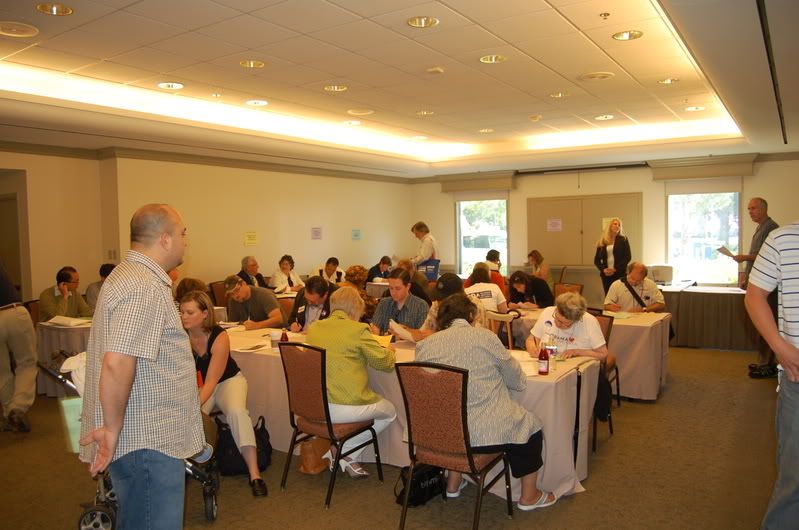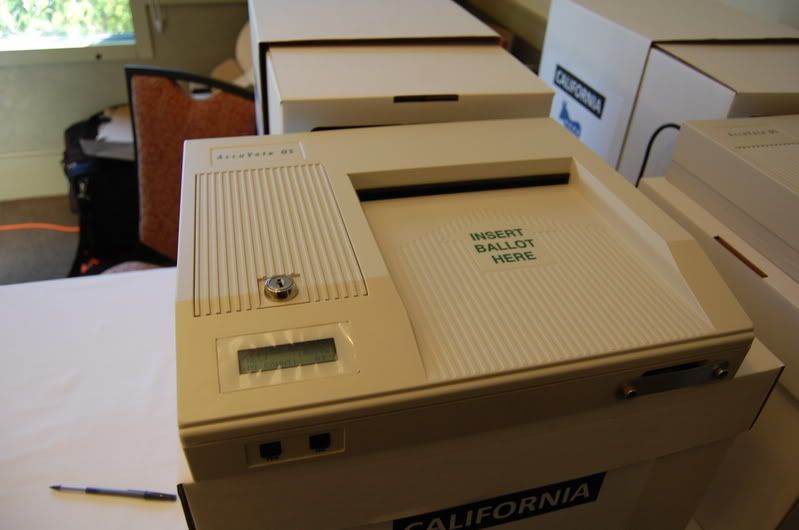Or something.
I’m still trying to make heads and tails of Bob Drogin’s narrative in Thursday’s L.A. Times regarding John McCain’s campaign strategy, which seems to be treating the entire country like one giant New Hampshire:
CINCINNATI — When John McCain campaigned here last week, he relied on his signature event, an unscripted town hall meeting, to sway undecided voters in this crucial swing state.
The presumed Republican presidential nominee paced with a microphone at Xavier University, taking questions about energy, the economy and other issues from about 150 people.
Problem is, it doesn’t work.
(see extended…)
First, let’s talk pure logistics. Running a general election campaign where there is one nationwide election day to focus on is not the same as a primary campaign, where (at the beginning at least) you can do retail politics across states with low population.
McCain’s brand of retail politics may have been effective in Iowa (where, remember, he came in second) and New Hampshire (where he won in a state that has traditionally been sympathetic to him), at which point the Republican nomination had essentially come down to between him and Huckabee when it was shown that Romney was such a disaster that he couldn’t even win in his own backyard.
But in a general election where you have to appeal to hundreds of millions of voters and get them to enthusiastically volunteer for your campaign and turn out all their friends and neighbors to vote for you as well, talking to 150 people in Cincinnati a couple of times a week just won’t cut it.
And that’s even if you’re working on weekends, which McCain just won’t do.
Instead, after workweeks full of fundraisers, town hall meetings and interviews, McCain has been, in campaign parlance, “down” on nearly every Saturday or Sunday for 20 weeks, largely sequestered away from the news media.
He’s usually spending time with family, friends and campaign advisers at residences in Arlington, Va., and Phoenix or vacation homes near Sedona, Ariz., and San Diego.
The problem is, though, that as much as McCain may enjoy bantering back and forth with (and perhaps insulting) participants at town hall meetings, he still can’t do jack to convince voters that he knows what the hell he’s talking about:
But McCain’s hourlong pitch didn’t persuade Rosemary Meinders, a wavering Democrat. His answers were too general, she said. “Honestly, I don’t know what I’m going to do.”
The next day, Janine Koss, a lifelong Republican, also was unconvinced after McCain met about 80 autoworkers at the General Motors Lordstown plant outside Youngstown. “Now I don’t know,” the 31-year-old assembly line worker said. “I really don’t know.”
I’m not really surprised that someone even a Republican would be ambivalent after hearing McCain speak. After all, he came to California recently and told us that we should open up our beautiful coastline to offshore drilling because it would make us feel good:
“I don’t see an immediate relief, but I do see that exploitation of existing reserves that may exist – and in view of many experts that do exist off our coasts – is also a way that we need to provide relief. Even though it may take some years, the fact that we are exploiting those reserves would have psychological impact that I think is beneficial.”
Bottom line: McCain has a campaign strategy of talking (poorly) to small handfuls of voters a few times a week.
It’s not exactly like he has a choice, though. What else is he going to do? Go head-to-head with Obama on the traditional campaign strategy of big rallies and inspiring speeches? Not even McCain’s rosiest sympathizers believe that’s an option. As Drogin writes:
Aides and supporters say the freewheeling sessions showcase the Arizona senator as a straight-talking candidate who is an expert on policy issues and ready to be president. It also lets him display a sense of humor that, they admit, is more appealing than his formal speeches, which can sound stilted. Even some GOP leaders have panned his delivery.
Cottage cheese in a lime jello salad, anyone? You can read the reviews on how it would look if McCain tried to match Obama on speeches.
But the other significant problem with McCain’s fondness for town halls goes beyond the fact that he just can’t close the deal. In fact, he risks losing the sale altogether.
“He’s very good for TV because there’s often a surprise,” she said. “You’re never sure what he’s going to say next. He moves into uncharted territory more readily than other politicians.”
That worries some supporters. They say McCain’s unstructured sessions often overshadow efforts to communicate a single, clear message each day. Worse, they fear, the routine events now only produce national news when he makes an error. Indeed, McCain has made his worst gaffes during town hall meetings.
As much as Republican strategists may wish to convince themselves that McCain’s “authenticity” (i.e., saying whatever seems convenient, no matter how tactless or insulting) can win him the day, the truth is that–unlike Obama’s rallies that are often the size of small cities–the only serious press that small town halls can generate is…negative press when you make a gaffe.
Before the digital age, this was not such a big deal. But now that anyone can be a journalist and all it takes is a small handheld camcorder, everything is fair game. And that’s bad news for John McCain, who likes to go off the cuff as a sign of “authenticity”.
So basically, the Republicans nominated a someone who can’t give a speech worth a damn who loves to do town halls (but can’t do too many and has to keep the schedule light owing to his age and stamina) and who gives inconsistent policy positions at the town halls that make message discipline impossible and who makes frequent gaffes during them.
And all that, simply because Republican primary voters couldn’t find anyone less unpalatable. Well played, GOP.
McCain has essentially turned himself not into a candidate, but into a walking POW war hero narrative whose relevance for the qualifications of the Presidency is not allowed to be questioned, all for a lack of consistency on any other issue.
I, for one, am certainly not losing any sleep over seeing that inviolate automatic qualification brought into question. If it’s all they have, why not try to take it away?




